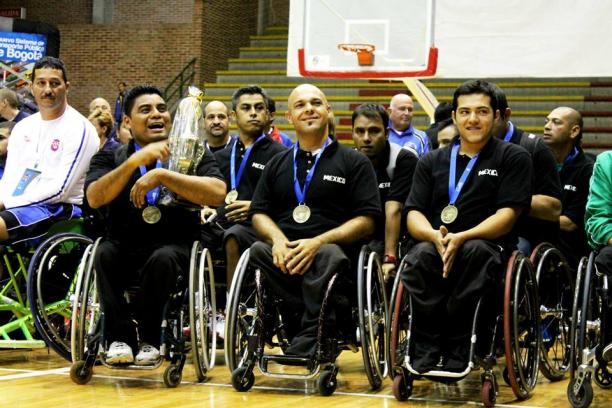No. 4: Mexican miracle in wheelchair basketball
28.12.2013Mexico shocked Paralympic champions Canada in the quarter-finals of the 2013 Americas Cup to advance to the World Championships.
 Mexico beat Canada in the quarter-finals of the 2013 Americas Cup. They could face each other again at the Toronto 2015 Parapan American Games.
© • IWBF
Mexico beat Canada in the quarter-finals of the 2013 Americas Cup. They could face each other again at the Toronto 2015 Parapan American Games.
© • IWBF
- Related Features
- No. 5: Teenage Aussie Maddison Elliott shocks swimming
- No. 6: Esther Vergeer retires but remains involved
- No. 7: Popow and Reardon share 100m T42 gold
- No. 8: Agitos Foundation strengthens Movement worldwide
- No. 9: Tokyo lands 2020 Paralympic Games
- No. 10: Zahra Nemati becomes Iranian role model
“We tried to avoid celebrating too much out of respect to Canada, but some of them could not avoid it. It was really a great moment for Mexico after so many years to once again qualify for the World Championships.”
Every sport has its share of upsets. So much so, that even the glitz and glamour of Hollywood has capitalised and built an industry based on underdog stories.
But in 2013, it was wheelchair basketball’s turn to have its own miracle moment.
When 2012 Paralympic gold medallists Canada hit the court against Mexico in the quarter-finals of the 2013 Americas Cup, with the winner qualifying for the 2014 World Championships in South Korea, to most people the result was a forgone conclusion.
But somebody forgot to tell that to Mexico.
Mexico shocked Canada 67-57 in the quarter-finals and went on to win bronze in the tournament, as Canada failed to qualify for the World Championships for the first time in history.
“We were always confident that we were good enough to qualify for the World Championships,” said Mexican guard Edgar Perdomo. “We know how good team Canada is, but we did not care. We were not intimidated by them.”
Playing back the tape
Mexico’s recent record on the world stage is quite modest, having last qualified for the Paralympic Games in 2000, when they finished 10th.
The finished ninth at the 2010 World Championships, and before that they finished 10th at the 1998 World Championships.
Comparatively, Canada’s recent dominance in the sport of wheelchair basketball has netted the team three golds and a silver at the last four Paralympics to go along with their 2006 world title.
Despite their mantle as the best in the game, Canada’s Coach Jerry Tonello said there was no sense of complacency going into the game against Mexico.
“It is always a challenge to maintain a team’s focus after achieving as much success as we have, but that is what we love – a challenge,” he said
Canadian veteran Bo Hedges mirrored his coach’s comments, saying the entire Canadian playing roster and staff were well aware what was at stake going into the game against Mexico.
“We knew the importance of the quarter-final game heading into it,” Hedges said. “It was do or die in terms of our chance to play at the 2014 World Championships, and so it wasn’t a game we took lightly.”
Respecting the opponent
As the quarter-final game tipped off, Mexico scored first and raced out to an eight-point lead at the end of the first quarter, which was quickly extended to 14 by the half.
Despite a small relapse early in the third quarter, Mexico cruised to the 10-point victory, knocking Canada out of World Championship contention for the first time in the tournament’s 38-year history.
“We tried to avoid celebrating too much out of respect to Canada, but some of them could not avoid it,” said Mexican head coach Aaron Davila.
“It was really a great moment for Mexico after so many years to once again qualify for the World Championships.”
Despite their disappointment, in true champion fashion, Hedges and the Canadian team were full of praise for Mexico.
“Mexico came out strong and shot the ball well all game, putting us on our heels and forcing us to play catch up for almost the entire game,” Hedges said. “It was a battle out there against a quality team with good players and in the end we had just dug a hole a bit too big to get out of and that’s tough against a good team.”
With such a proud history in the sport, Tonello said despite the loss his team should not be underestimated and that the future is very bright for Canadian wheelchair basketball.
“In a way this will force us to put more time into the development of younger players and also to heal up some players, but don’t get me wrong, this is no blessing in disguise,” he said. “We would much rather be at the World Championships and will work harder than ever to be back on top in 2016.”



















